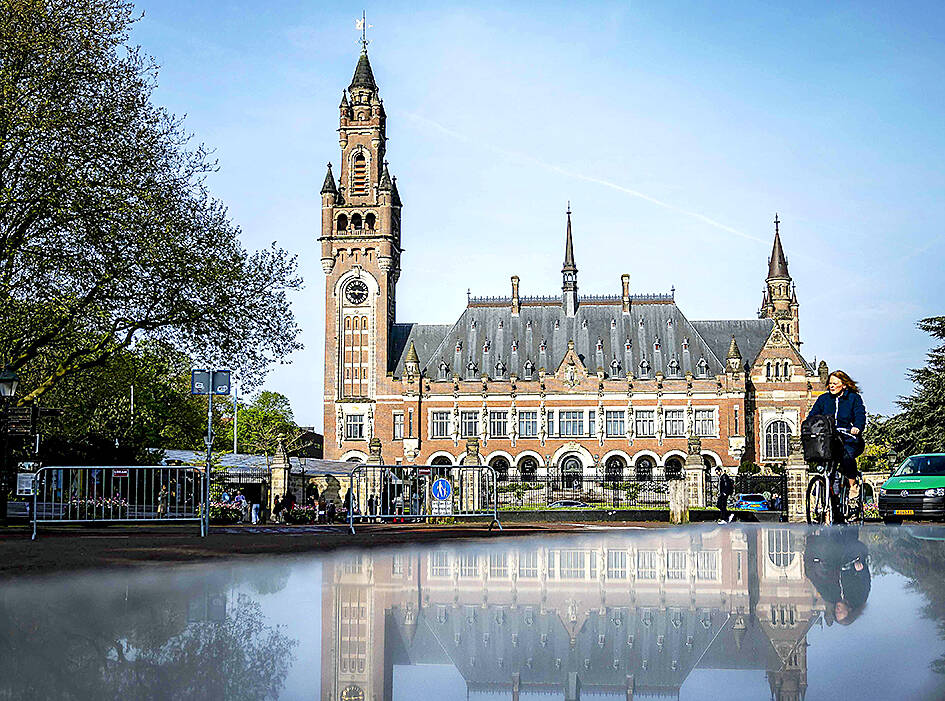The top UN court is to take up the largest case in its history today when it opens two weeks of hearings into what countries worldwide are legally required to do to combat climate change and help vulnerable nations fight its devastating impact.
After years of lobbying by island nations who fear they could simply disappear under rising sea waters, the UN General Assembly asked the International Court of Justice last year for an opinion on “the obligations of States in respect of climate change.”
“We want the court to confirm that the conduct that has wrecked the climate is unlawful,” said Margaretha Wewerinke-Singh, who is leading the legal team for the Pacific island nation of Vanuatu.

Photo: AFP
In the decade up to last year, sea levels have risen by a global average of about 4.3cm, with parts of the Pacific Ocean rising higher still. The world has also warmed 1.3°C since pre-industrial times because of the burning of fossil fuels.
Vanuatu is one of a group of small states pushing for international legal intervention in the climate crisis.
“We live on the front lines of climate change impact. We are witnesses to the destruction of our lands, our livelihoods, our culture and our human rights,” Vanuatu’s climate change envoy Ralph Regenvanu told reporters ahead of the hearing.
Any decision by the court would be non-binding advice and unable to directly force wealthy nations into action to help struggling countries. Yet it would be more than just a powerful symbol since it could serve as the basis for other legal actions, including domestic lawsuits.
From today, The Hague-based court would hear from 99 countries and more than a dozen intergovernmental organizations over two weeks. It is the largest lineup in the institution’s nearly 80-year history.
Last month at the UN’s annual climate meeting, countries cobbled together an agreement on how rich countries can support poor countries in the face of climate disasters. Wealthy countries have agreed to pool together at least US$300 billion a year by 2035, but the total is short of the US$1.3 trillion that experts and threatened nations said is needed.
Fifteen judges from around the world would seek to answer two questions: What are countries obliged to do under international law to protect the climate and environment from human-caused greenhouse gas emissions? And what are the legal consequences for governments where their acts, or lack of action, have significantly harmed the climate and environment?
The second question makes particular reference to “small island developing States” likely to be hardest hit by climate change.

TRAGEDY STRIKES TAIPEI: The suspect died after falling off a building after he threw smoke grenades into Taipei Main Station and went on a killing spree in Zhongshan A 27-year-old suspect allegedly threw smoke grenades in Taipei Main Station and then proceeded to Zhongshan MRT Station in a random killing spree that resulted in the death of the suspect and two other civilians, and seven injured, including one in critical condition, as of press time last night. The suspect, identified as a man surnamed Chang Wen (張文), allegedly began the attack at Taipei Main Station, the Taipei Fire Department said, adding that it received a report at 5:24pm that smoke grenades had been thrown in the station. One man in his 50s was rushed to hospital after a cardiac arrest

SAFETY FIRST: Double the number of police were deployed at the Taipei Marathon, while other cities released plans to bolster public event safety Authorities across Taiwan have stepped up security measures ahead of Christmas and New Year events, following a knife and smoke bomb attack in Taipei on Friday that left four people dead and 11 injured. In a bid to prevent potential copycat incidents, police deployments have been expanded for large gatherings, transport hubs, and other crowded public spaces, according to official statements from police and city authorities. Taipei Mayor Chiang Wan-an (蔣萬安) said the city has “comprehensively raised security readiness” in crowded areas, increased police deployments with armed officers, and intensified patrols during weekends and nighttime hours. For large-scale events, security checkpoints and explosives

PUBLIC SAFETY: The premier said that security would be tightened in transport hubs, while President Lai commended the public for their bravery The government is to deploy more police, including rapid response units, in crowded public areas to ensure a swift response to any threats, President William Lai (賴清德) said yesterday after a knife attack killed three people and injured 11 in Taipei the previous day. Lai made the remarks following a briefing by the National Police Agency on the progress of the investigation, saying that the attack underscored the importance of cooperation in public security between the central and local governments. The attack unfolded in the early evening on Friday around Taipei Main Station’s M7 exit and later near the Taipei MRT’s Zhongshan

A car bomb killed a senior Russian general in southern Moscow yesterday morning, the latest high-profile army figure to be blown up in a blast that came just hours after Russian and Ukrainian delegates held separate talks in Miami on a plan to end the war. Kyiv has not commented on the incident, but Russian investigators said they were probing whether the blast was “linked” to “Ukrainian special forces.” The attack was similar to other assassinations of generals and pro-war figures that have either been claimed, or are widely believed to have been orchestrated, by Ukraine. Russian Lieutenant General Fanil Sarvarov, 56, head